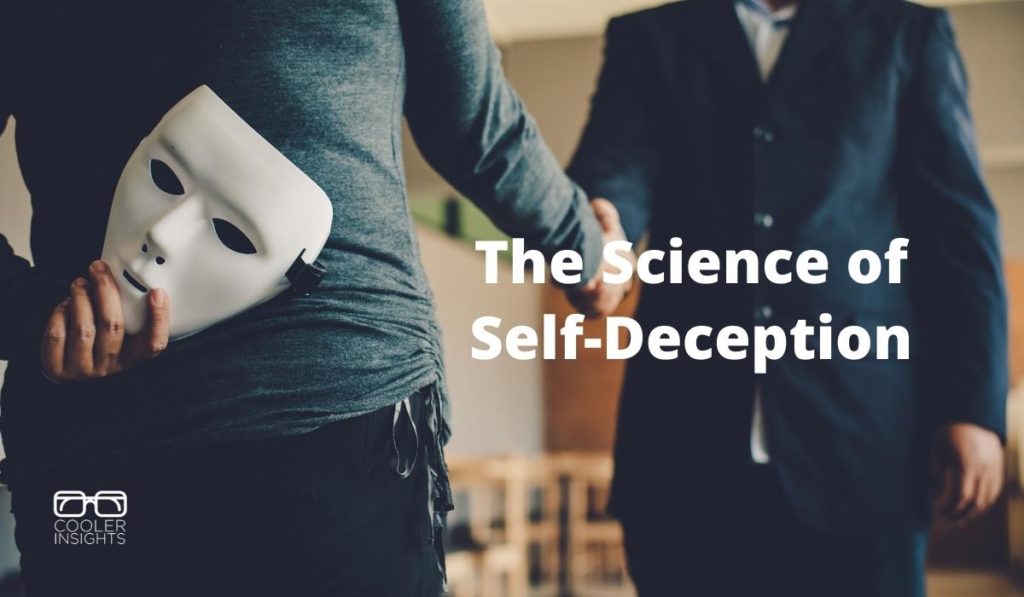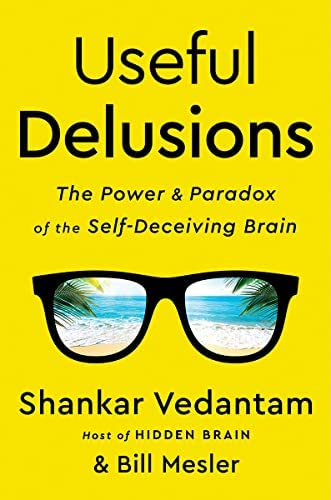
Contrary to popular belief, self-deception is very much a part of who you are.
Many of us fabricate fictional narratives that run our lives — from the moment we awake to the time we fall asleep.
While most of us wouldn’t consider ourselves as serial liars, cheats, and deceivers, we often conceive imaginary scenarios that aren’t rooted in reality.
From imitating how a CEO would behave, to pretending that we agree with our loved ones, many of us are guilty of acts of self-deception across all facets of life: at work, at play, with our loved ones, and in society.
Should we then repent from our sins of personal truth omission? Not according to Hidden Brain host Shankar Vedantam and science writer Bill Mesler, authors of the book Useful Delusions — The Power & Paradox of the Self-Deceiving Brain.
Quoting from the book:
“Yes, this means you miss the truth, but it gets you to the real goal: Your brain has been designed to help you survive, to forage for opportunities, to get along with mates and friends, to raise offspring to adulthood, and to avoid feelings of existential despair.”
In short, the fact filtering process of our brain actually keeps us alive.
To understand how self-deception and false beliefs works, let us now look at the insights from the book. Drawn from the fields of neuroscience, philosophy, and psychology, they provide a fascinating glimpse of human behaviours.
#1 Everyday Examples of Self-Deception
“How are you doing?”
“I’m fine, thank you!”
How many of you greet others without meaning what you say? Raise your hands if you do!
You’re not alone. Many of us lie to each other every single day, often with good intentions not to hurt the other person’s feelings. Indeed, civility and “hot air” are vital to the functioning of teams and organisations.
Try saying “You look like a dog’s breakfast!” to an untidy looking boss/customer, and see what happens!
While honesty should still be the best policy, there are occasions where lies could help a person who is vulnerable or hurting. For instance, lies of omission—not telling an employee that their colleague was promoted before them—may prevent them from feeling miserable.
When people we love experience a setback or a failure, telling the truth may be difficult. Here, you’ll need to exercise empathy to decide if you should just be “brutally honest” or be silent. (What Shankar termed “benevolent deception” and “optimistic self-deception”.)
In an extreme case, hiding the truth may help the ill and infirmed to heal faster. Witness numerous examples of placebos helping sick people to get well more quickly (“mind over matter”). Or doctors who exercise patience and compassion (aka “bedside manners”) being able to shorten the recovery time for their patients.
Finally, self-deception exists through the influence of “invisible” factors like price, storytelling, myth building and branding. All of these factors affect our perception of value. While they may not be outright acts of deceit, you do have to admit that they aren’t black-and-white indicators of quality.
#2 How Self-Deception Gives Us Meaning
Designed to defend us against physical and emotional threats, our brains are wired with “bugs”—cognitive errors that distort reality and provide an illusory view of the world.
According to the book, these in-built delusions were designed to “lead to a greater likelihood of survival and reproduction.”
The greatest of these is love. Often, it leads us to do acts of self-sacrifice so that the greater interests of the community (and hence our gene pool) will survive. Irrationally positive behaviours may stem from acts of the heart—what UCLA psychologist Shelley Taylor termed as “positive illusions.”
Such benevolent acts of self-deception act as a counter to “depressive realism”—a condition where people see reality more clearly. Interestingly, people who see reality for what it truly is (rather than through rose-tinted lenses) may have a higher chance of suffering from depression or other mental disorders.
Cognitive distortions are also the secret to long and lasting marriages. Couples who are in love tend to denigrate potential alternatives to their current romantic partner—even when they are objectively superior. (Hence, love is blind and biased.)
We also tend to see ourselves better than what we really are. This act of “wishful seeing” is vital in keeping us upbeat and positive.
It is also useful to note that our senses are flooded with information. By ignoring certain things, our brains are programmed to focus on only a few things at a time.
Finally, consider the phenomenon of cognitive dissonance—it is painful for our brains to hold opposing ideas, and we seek ways to relieve this conflict. This was apparent in the case of the Church of Love, where lonely single men deceived by trickster Donald Lowry refused to speak up against him.
#3 Self-Deceptions in Communities, Tribes and Nations
Are there delusions that have impacted entire groups of people? Well, Shankar believes so, based on the last section of the book.
There are three examples of self-deceptions occurring on a massive scale.
Rituals: From tribal rituals in aboriginal communities to modern day “hazing” in universities, initiative rites have been used to draw people together. Often these are used to foster “collective effervescence”—acts which give participants a feeling of belonging and reassurance.
The more costly the ritual (and greater the sacrifice), the more powerful it is in signaling our commitment to a group, ideology and cause.
Nations: Contrary to what we believe, nations, cities and economies are figments of fiction. They only exist because we choose to believe in them.
Many countries have founding myths that are foundational to the construction of the nation. Often, these myths are what they are. For instance, the United States of America calls itself “the land of the free” even though its founding has resulted in the massive slaughter and displacement of uncountable numbers of native Americans.
Religions: Last, but certainly not least, we have religions and other spiritual beliefs. According to the book, many of the world’s major belief systems have similar structures—a system for moral behaviour, an obsession with the afterlife, and the concept of eternal rewards.
To ensure group cohesion and solidarity, religions were invented to bring people together in times when resources are scarce. The “fear of an angry, supernatural God is an extremely effective stick to get large numbers of people to treat each other properly and to act ethically.”
Conclusion — Choose What You Believe In
Well-written and peppered with lots of interesting stories, Useful Delusions is an engaging read.
Its main hypothesis is that the truth may sometimes matter less than what works. Hence, it may be alright for false beliefs to still persist so long as they provide functional benefits. In other words…
“Why put the emphasis on the truth or falsity of the stories, rather than on what the stories do for us?”
As a Christian, I certainly hold firm to certain beliefs about God, Jesus and The Bible. Unlike Shankar, I have strong evidence to believe that my beliefs are true, hence I cannot subscribe totally to the notion that religions are “social innovations”.
Having said that, there are certainly grains of truth in what the book purports about self-deceptions, and it helps me to be more mindful about how I interact with the world around me.
What about you? What are your thoughts on the potential benefits of self-deceptions?

